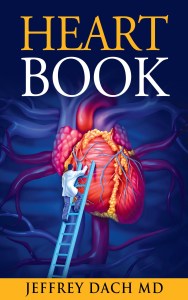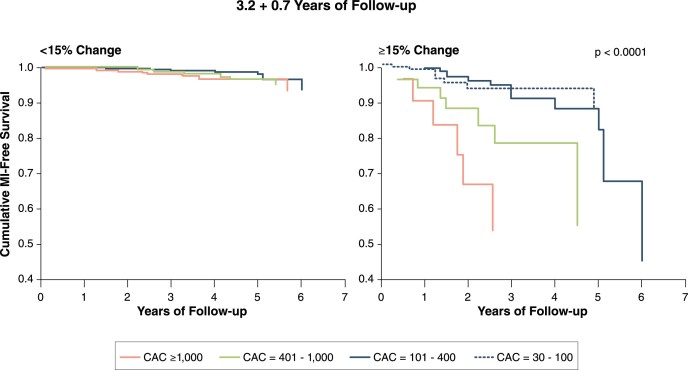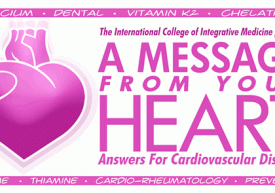Message from your Heart, Answers for Cardiovascular Disease ICIM March 2019
I am excited and look forward to speaking at the upcoming meeting “A Message from your Heart; Answers for Cardiovascular Disease“ with Eric Born, MD Program Chairman and Wendy Chappell, Executive Director, International College of Integrative Medicine. March 6-10, 2019 Philadelphia. The title of my talk is: “Cardiovascular Disease, Hormones and Coronary Artery Calcium Scores.”
I am honored to be be included in a prestigious group of speakers: See List of Speakers: Click Here. For more information and Meeting Registration: Click Here
 As an interventional/vascular radiologist over a 30-year career, I experienced first-hand the shortcomings and failures of the cholesterol-statin dogma. This experience as a radiologist looking at arterial disease forms the basis for my new book available on Amazon entitled “Heart Book”, which explains in detail why conventional cardiology is in crisis. The old cholesterol-statin dogma has been falsified by modern imaging techniques, and has been replaced by a new paradigm with a completely new understanding of the etiology and prevention of coronary artery disease. Even though the seeds of change are planted in their own peer reviewed medical literature, mainstream cardiology is in denial, clinging to the old dogmas of the past. And this is for a very for good reason.
As an interventional/vascular radiologist over a 30-year career, I experienced first-hand the shortcomings and failures of the cholesterol-statin dogma. This experience as a radiologist looking at arterial disease forms the basis for my new book available on Amazon entitled “Heart Book”, which explains in detail why conventional cardiology is in crisis. The old cholesterol-statin dogma has been falsified by modern imaging techniques, and has been replaced by a new paradigm with a completely new understanding of the etiology and prevention of coronary artery disease. Even though the seeds of change are planted in their own peer reviewed medical literature, mainstream cardiology is in denial, clinging to the old dogmas of the past. And this is for a very for good reason.
While the cholesterol-statin dogma failed to prevent progression of coronary artery disease, the new paradigm does, and will ultimately make cardiology stenting/bypass procedures obsolete, or much reduced in scale. This could spell the end of procedure-based cardiology. The new tool at the core of this paradigm shift is the serial calcium score, and the realization that interventions which prevent progression of calcium score also serve to prevent progression of coronary artery disease.
Armed with this new knowledge, you will be emboldened to embark on a journey to prevent, and in some cases, regress coronary artery disease in your patient population. This is an important conference which is long over-due. Thanks and credit go to the pioneering and courageous spirit of ICIM which makes “Answers in Cardiovascular Disease” possible. I wouldn’t dream of missing it.
Cardiology Paradigm Shift in One Chart
Left Chart shows less than 15% progression of calcium score (CAC) carries a benign prognosis regardless of starting score, with Myocardial Infaction-free survival near 100%.
Right Chart shows greater than 15% annual progression of calcium score (CAC) carries poor prognosis with reduced survival correlating with starting calcium scores.

Above image is Figure 5 from Hecht 2015 , originally from Raggi 2004. Progression of CAC and Risk of First MI in 495 Asymptomatic Patients Receiving Cholesterol-Lowering Therapy.
(Left Chart) CAC progression of <15% per year is associated with a benign prognosis irrespective of the baseline CAC, implying stabilization of the atherosclerotic process.
(Right Chart) CAC progression of >15% per year is associated with a poor prognosis directly related to the baseline CAC, implying new plaque formation and inadequacy of treatment. CAC = coronary artery calcium; MI = myocardial infarction. JACC: Cardiovascular Imaging Volume 8, Issue 5, May 2015 Coronary Artery Calcium Scanning Past, Present, and Future Harvey S. Hecht, Original data from Raggi Paolo 2004
Articles with Related Interest:
Reducing Calcium Score with Aged Garlic
Calcium Score Paradigm Shift in Cardiology
LDL Cholesterol Particle Size, What Gives?
Low Level Endotoxemia LPS Theory of Coronary Artery Disease
Leaky Gut and Low level Endotoxemia
Vitamin K , Is There Anything It Cant Do? Benefits for Calcium Score
Autopsy Studies Show No Correlation
Statin Denialism Internet cult
Jeffrey Dach MD
7450 Griffin Road
Suite 180/190
Davie, Florida 33314
954-792-4663
References:
Header Image Courtesy of ICIM Web Site
Budoff, Matthew J., et al. “Progression of coronary artery calcium predicts all-cause mortality.” JACC: Cardiovascular Imaging 3.12 (2010): 1229-1236. Progression of coronary artery calcium predicts all-cause mortality Budoff Matthew JACC Cardiovascular Imaging 2010
Raggi, P., et al. “Progression of coronary calcium on serial electron beam tomographic scanning is greater in patients with future myocardial infarction.” The American journal of cardiology 92.7 (2003): 827.
Raggi, Paolo, Tracy Q. Callister, and Leslee J. Shaw. “Progression of coronary artery calcium and risk of first myocardial infarction in patients receiving cholesterol-lowering therapy.” Arteriosclerosis, thrombosis, and vascular biology 24.7 (2004): 1272-1277.Progression of coronary artery calcium risk of myocardial infarction cholesterol-lowering therapy Raggi Paolo Arteriosclerosis thrombosis vascular biology 2004
Hecht, Harvey S. “Coronary artery calcium scanning: past, present, and future.” JACC: Cardiovascular Imaging 8.5 (2015): 579-596.
Hecht, Harvey S., and Jagat Narula. “Coronary artery calcium scanning in asymptomatic patients with diabetes mellitus: a paradigm shift.” Journal of diabetes 4.4 (2012): 342-350.
Budoff, Matthew J., et al. “Progression of coronary calcium and incident coronary heart disease events: MESA (Multi-Ethnic Study of Atherosclerosis).” Journal of the American College of Cardiology 61.12 (2013): 1231-1239.Progression of coronary calcium and heart disease events MESA Budoff Matthew J Amer Col Card 2013
Arad, Yadon, et al. “Treatment of asymptomatic adults with elevated coronary calcium scores with atorvastatin, vitamin C, and vitamin E: the St. Francis Heart Study randomized clinical trial.” Journal of the American College of Cardiology 46.1 (2005): 166-172.
Mori, Hiroyoshi, et al. “Coronary artery calcification and its progression: what does it really mean?.” JACC: Cardiovascular Imaging 11.1 (2018): 127-142.
Budoff, Matthew J., and John Tayek. “Coronary Artery Calcium Progression: Increasing CAC Is Associated With Increased Events.” (2018): 517-518.
Yeh Y, Nakanishi R, Budoff MJ. Coronary artery disease progression: insights from cardiac CT. Curr Cardiovasc Imaging Rep 2015;8:24–32.
McEvoy, John W., et al. “Coronary artery calcium progression: an important clinical measurement?: A review of published reports.” Journal of the American College of Cardiology 56.20 (2010): 1613-1622.
Henein, Michael, et al. “High dose and long-term statin therapy accelerate coronary artery calcification.” International journal of cardiology 184 (2015): 581-586.
Malguria, Nagina, Stefan Zimmerman, and Elliot K. Fishman. “Coronary Artery Calcium Scoring: Current Status and Review of Literature.” Journal of computer assisted tomography 42.6 (2018): 887-897.
pdf
Tesche, Christian, et al. “Current and future applications of CT coronary calcium assessment.” Expert review of cardiovascular therapy 16.6 (2018): 441-453.
Burge, Mark R., et al. “Management of Asymptomatic Patients With Positive Coronary Artery Calcium Scans.” Journal of the Endocrine Society 1.6 (2017): 588-599.
This body of literature supports the conclusion that CAC testing is a major advance in noninvasive methodology to detect coronary artery disease and to predict future cardiovascular events and death.
serial coronary intravascular ultrasound,
Puri R1, Nicholls SJ2, Shao M3, Kataoka Y2, Uno K3, Kapadia SR4, Tuzcu EM4, Nissen SE5.Impact of statins on serial coronary calcification during atheroma progression and regression.J Am Coll Cardiol. 2015 Apr 7;65(13):1273-1282. CONCLUSIONS:Independent of their plaque-regressive effects, statins promote coronary atheroma calcification. These findings provide insight as to how statins may stabilize plaque beyond their effects on plaque regression.
Shaw, Leslee J., Jagat Narula, and Y. Chandrashekhar. “The never-ending story on coronary calcium: is it predictive, punitive, or protective?.” (2015): 1283-1285.
Published on November 21st, 2018 by
The post Message from your Heart-Answers for Cardiovascular Disease ICIM March 2019 appeared first on Jeffrey Dach MD.










Leave a Comment
You must be logged in to post a comment.